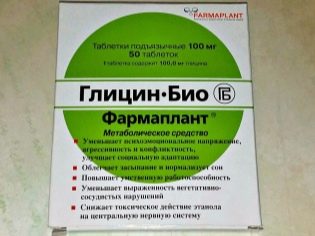"Glycine" during pregnancy: instructions for use
Most expectant mothers have fears and experiences associated with the upcoming childbirth, with the health of the toddler, and with the changes in life that will occur after the baby is born. They often increase anxiety, worsen mood and interfere with normal sleep. In addition, many pregnant women suffer from mood swings and emotional surges, and stress can badly affect the state of the crumbs in the womb.
Therefore, to eliminate anxiety and reduce the tension of the nervous system, the doctor may prescribe to the expectant mom that safe sedativeas "glycine".
Features of the drug
"Glycine" is available in pill form, which is absorbed by the cheek or under the tongue. They are characterized by white color, sweet aftertaste and round shape. These tablets are sold in packs of 50 pieces (there are also packs with 10 or 20 tablets) and are non-prescription drugs. Their shelf life is 3 years, and you need to keep this medication at home. in a dry place at temperatures below 25 degrees Celsius.
The drug got its name due to the amino acid of the same name, which is its main ingredient. Such an amino acid is replaceable, that is, it can be synthesized in the body from other amino acids. It is also found in various foods, for example, it is abundant in liver, oatmeal, beef, and nuts.
Each tablet "Glycine" contains 100 mg of this amino acid, and methylcellulose and magnesium stearate are the auxiliary components of the drug. These substances are added to the composition of the drug in a small amount to maintain a dense form.
There are no sweeteners, dyes, preservatives or other harmful additives in the composition of "Glycine".
How does it work?
Unlike glycine from food, which enters the digestive tract, where it is absorbed, like other amino acids, and is involved in protein metabolism, the main component of glycine in tablets penetrates the bloodstream, being absorbed into small vessels of the oral cavity.
After that, it is transferred to the brain cells and affects the nervous system, enhancing the processes of inhibition and reducing nervous excitement. This normalizes the function of the brain and has a positive effect on the emotional and psychological state of the patient.
In addition, through the use of "Glycine" can reduce the harmful effects of many drugs that inhibit the work of the central nervous system. However, we note that such effects are observed only with the correct use of tablets - if they are slowly absorbed in the mouth.
If ingested, glycine will get into the stomach, which will exclude its effect on brain cells.
Is it allowed during pregnancy?
In the list of contraindications to the admission of "Glycine" there is no mention of the fact that such pills are prohibited during the period of carrying the child. Doctors often prescribe them to expectant mothers, calling them safe for the baby in the stomach, since the active substance "Glycine" gets to the fetus in small quantities. And even the percentage of medicine that has penetrated the baby does not have any harmful effect on the development of the baby or on the state of the uterus.
Due to the natural origin of the drug and the mild effect on the woman's body "Glycine" is more useful than harmful during pregnancy, as it protects the nervous system of the expectant mother from stress and has a calming effect. After a course of such medication a woman becomes less nervous and emotional, reacts adequately to the changes in her life, and the quality of her sleep improves.
The drug can be used in the early stages of gestation, and in the second and third trimesters.
When is appointed future mothers?
One of the most frequent reasons for using "Glycine" during pregnancy are strong feelings and disturbed sleep patterns. The drug is in demand as a protection of the central nervous system from the load that is placed on the brain during the carrying of the infant. He is discharged with fatigue, nervousness, anxiety, poor appetite, weakness, intermittent sleep, insomnia, or difficulty falling asleep.
Thanks to the reception of "Glycine" the expectant mother can adjust the rhythm of rest and sleep, avoiding overwork. This drug is also prescribed. for the prevention of depression and neurosis, because these problems may appear or worsen during childbirth.
As many pregnant women say in their reviews, the course of Glycine soothes, increases efficiency, reduces anxiety, and improves mood.
Such a drug is also prescribed if the expectant mother has high blood pressure. Since many drugs to reduce blood pressure are contraindicated during pregnancy, and this symptom often accompanies the process of carrying, it is necessary to resort to safe for the crumbs of means, which include "Glycine".
This medication is also used for more serious problems with the brain, for example, if a woman has been diagnosed with a head injury or developed encephalopathy. It is also included in the complex therapy of preeclampsia and intrauterine hypoxia.
Although the drug is called harmless to the fetus, its independent use without the advice of a doctor is not recommended.
A good specialist will help determine whether the expectant mother really needs Glycine, Does not harm such medicine to the female body, and also determine the optimal regimen and the duration of the course of such tablets.
In addition, it is possible that after talking with a specialist a woman will be able to avoid taking medicine by changing the daily routine, frequent walks, relaxing baths, listening to classical music and similar influences, which also calm the nervous system well. In such cases, the reception of "Glycine" is no longer needed.
Contraindications
In the annotation to the drug, it is noted that it should not be administered only in case of hypersensitivity to glycine or auxiliary ingredients of tablets.
At lower blood pressure taking the drug requires increased caution.
There are no other contraindications for this medication, but for any serious illnesses or problems with gestation It is important to consult a doctor and strictly follow the prescribed treatment regimen, not exceeding the dosage.
Possible harm
Occasionally, "Glycine" causes itching of the skin, rashes, and other allergic symptoms, in the event of which the use of tablets is immediately stopped. If the expectant mother has a tendency to reduced blood pressure, then treatment with "Glycine" can provoke hypotension, which will negatively affect the condition of the pregnant woman and require discontinuation of the drug. Other adverse reactions while taking the pills do not usually occur.
In addition to intolerance, the harm of "Glycine" is also caused by its overdose. If a woman accidentally takes more pills than prescribed by a doctor, it can cause nausea, decreased pressure, lethargy, dizziness, and other symptoms. When they appear, a medical examination is recommended.
Instructions for use
The drug is taken, regardless of the diet, twice or thrice a day.The dosage is selected for each future mother separately, but usually one tablet is used at a time. It is placed under the tongue or cheek, and then slowly absorbed, so that the components of the medicine fall into the sublingual capillaries. It is impossible to swallow "Glycine", but it is allowed to grind a pill into powder or divide it into smaller pieces so that it will quickly dissolve in the mouth.
As for the duration of use, once "Glycine" do not drink, since it will be ineffective and will not affect the state of the brain. For a visible therapeutic effect, this medicine should be taken in a course that usually lasts from seven days to one month. How long should the pills be used for a specific expectant mother should be clarified with the doctor.
If you need to repeat the course, this is possible not earlier than one month after the previous one is completed.
Reviews
On the use of "Glycine" you can see quite a lot of positive feedback from both patients and doctors. According to women who took Glycine while waiting for a child, the drug helps with poor sleep, anxiety, increased anxiety and similar problems.
Its effectiveness is assessed as average, because the drug does not cope with severe stress. The advantages of tablets patients usually include good tolerability, pleasant taste and affordable cost (the average price of 50 tablets is 30-40 rubles).
Analogs
Choosing a similar medicine, the expectant mother may encounter other variants of "Glycine", which have a slightly different name. Among them are full-fledged analogues, which have the same dosage and the same scope of application ("Glycine-MHPP" and "Glycine-Bio"), and preparations with a higher dose of the active ingredient ("Glycine Forte", containing 250 mg of amino acid per one pill). The use of these drugs, instead of "Glycine", during pregnancy is acceptable, but first, you should consult a doctor.
However, under the name "Glycine" there are also dietary supplements. One of them is a pill called Glycine Forte Evalar. They contain not only a high dose of amino acids (250 mg in each tablet), but also other active substances, which are vitamins from group B (they are represented by vitamins B12, B1 and B6). According to the manufacturer, this supplement helps to normalize sleep and strengthen mental performance, but it is contraindicated for pregnant women.
Among drugs with a similar effect, instead of "Glycine" can be used "Valerian" tablets. This remedy is praised for its plant base and a good sedative effect, therefore many expectant mothers choose it for fatigue, stress and insomnia.
But due to the increased risk of an allergic reaction, the use of "Valeriana" while waiting for a child should be monitored by a doctor.
For more information about taking the drug "Glycine" during pregnancy, see the following video.























